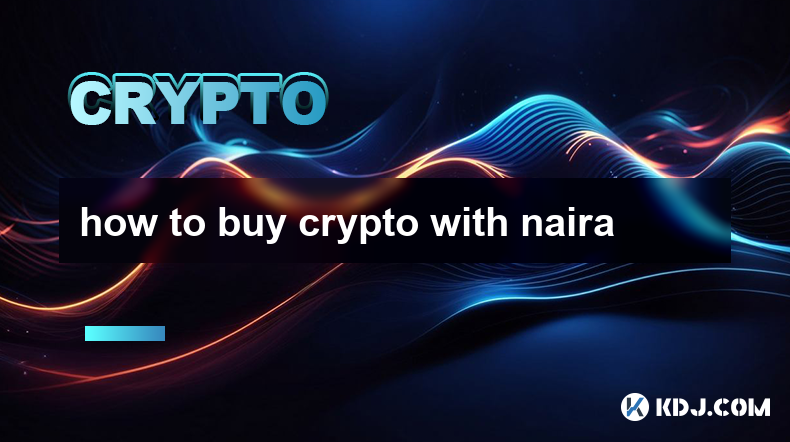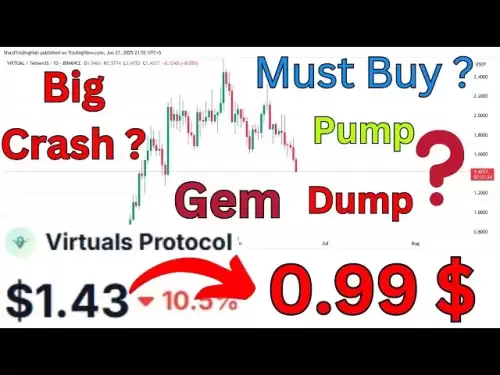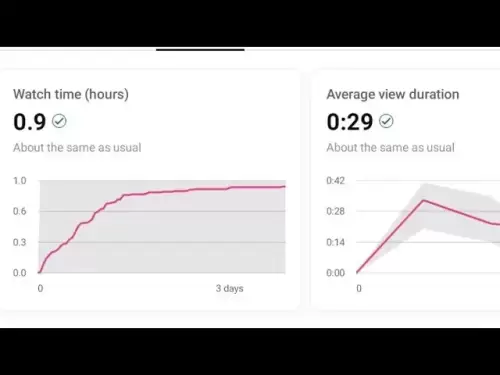-
 Bitcoin
Bitcoin $103,456.1111
0.49% -
 Ethereum
Ethereum $2,414.9631
0.02% -
 Tether USDt
Tether USDt $1.0006
0.05% -
 XRP
XRP $2.1083
0.24% -
 BNB
BNB $634.8760
-0.76% -
 Solana
Solana $139.8437
1.94% -
 USDC
USDC $0.9998
-0.01% -
 TRON
TRON $0.2737
0.97% -
 Dogecoin
Dogecoin $0.1602
0.20% -
 Cardano
Cardano $0.5737
1.08% -
 Hyperliquid
Hyperliquid $32.9779
-2.54% -
 Bitcoin Cash
Bitcoin Cash $474.8886
-1.80% -
 Sui
Sui $2.6272
-1.99% -
 Chainlink
Chainlink $12.4878
0.14% -
 UNUS SED LEO
UNUS SED LEO $8.9234
0.35% -
 Stellar
Stellar $0.2411
-0.18% -
 Avalanche
Avalanche $17.0274
-0.70% -
 Toncoin
Toncoin $2.8936
-1.11% -
 Shiba Inu
Shiba Inu $0.0...01112
-0.58% -
 Litecoin
Litecoin $82.6982
1.33% -
 Hedera
Hedera $0.1423
-0.05% -
 Monero
Monero $314.8455
3.26% -
 Ethena USDe
Ethena USDe $1.0006
0.01% -
 Polkadot
Polkadot $3.4043
1.14% -
 Dai
Dai $0.9999
0.01% -
 Bitget Token
Bitget Token $4.2848
-0.13% -
 Uniswap
Uniswap $6.8748
-5.45% -
 Pepe
Pepe $0.0...09661
0.52% -
 Pi
Pi $0.5359
1.19% -
 Aave
Aave $242.9168
-1.03%
how to buy crypto with naira
To purchase cryptocurrency in Nigeria, you'll need to select a crypto exchange, verify your identity, fund your account with Nigerian Naira, choose the desired asset, and securely store it after purchase.
Jan 31, 2025 at 12:54 am

Key Points:
- Determine the appropriate crypto exchange or platform for Nigerian users
- Create an account and verify your identity
- Fund your account with Nigerian Naira
- Select the desired cryptocurrency and place an order
- Store your cryptocurrency securely
How to Buy Crypto with Naira
1. Choose a Crypto Exchange or Platform
Several crypto exchanges and platforms cater to Nigerian users. Here are some popular options:
- Binance: A global exchange with a large user base and a wide selection of cryptocurrencies.
- Paxful: A peer-to-peer exchange that allows users to buy and sell cryptocurrencies directly with each other.
- Luno: A South African exchange that offers a user-friendly interface and low fees.
- NairaEX: A Nigerian exchange that focuses on offering crypto services tailored to local users.
2. Create an Account and Verify Your Identity
Once you select an exchange, navigate to its website or mobile app and create an account. Typically, this involves providing personal information, such as your name, email address, and phone number. Most exchanges require ID verification for security purposes. This process usually involves uploading a government-issued ID and taking a selfie.
3. Fund Your Account with Nigerian Naira
To purchase cryptocurrency, you need to deposit Nigerian Naira into your exchange account. Different exchanges offer various funding methods tailored to Nigerian users:
- Bank transfer: Most exchanges allow you to deposit Naira from your Nigerian bank account.
- Third-party payment providers: Exchanges partner with payment providers like Flutterwave, enabling users to fund their accounts with debit cards, mobile money, and USSD.
- Peer-to-peer (P2P): Some exchanges facilitate direct transactions between buyers and sellers, allowing you to purchase Naira with alternative payment methods.
4. Select and Purchase Cryptocurrency
Once your account is funded, you can buy your desired cryptocurrency. Most exchanges offer a variety of options, including Bitcoin, Ethereum, Dogecoin, and Tether. Here are the steps:
- Navigate to the exchange's trading platform.
- Search for the cryptocurrency you want to buy.
- Choose the trading pair that matches your Nigerian Naira deposit (e.g., NGN/BTC).
- Enter the amount of Naira you wish to spend or the amount of cryptocurrency you want to receive.
- Place a buy order at the current market price or set a limit order to buy at a specific price.
5. Store Your Cryptocurrency
After purchasing your cryptocurrency, it is crucial to store it securely. Here are some options:
- Exchange wallets: Many exchanges provide built-in wallets to store your cryptocurrency on their platform.
- Software wallets: Download software wallets such as Exodus or MetaMask to store your cryptocurrency on your computer or mobile device.
- Hardware wallets: Consider purchasing a hardware wallet like a Ledger or Trezor to keep your cryptocurrency offline and secure.
FAQs:
Q: Can I buy crypto with cash in Nigeria?
A: Yes, some exchanges offer peer-to-peer (P2P) services that allow you to meet in person and exchange cash for cryptocurrency.
Q: What is the best crypto exchange for Nigerians?
A: The best exchange depends on your individual needs. Binance offers a large selection and global presence, while Luno is user-friendly and has low fees.
Q: How long does it take to verify my identity on a crypto exchange?
A: Verification time varies depending on the exchange. Typically, it takes a few hours or up to a few days.
Q: What are the fees associated with buying crypto with Naira?
A: Fees vary across exchanges. Generally, you can expect to pay a trading fee, a deposit fee for funding your account, and a withdrawal fee for transferring your cryptocurrency.
Q: How do I protect myself when buying crypto with Naira?
A: Ensure you use a reputable exchange with strong security measures. Be wary of scams and phishing attempts. Store your cryptocurrency securely in a software or hardware wallet.
Disclaimer:info@kdj.com
The information provided is not trading advice. kdj.com does not assume any responsibility for any investments made based on the information provided in this article. Cryptocurrencies are highly volatile and it is highly recommended that you invest with caution after thorough research!
If you believe that the content used on this website infringes your copyright, please contact us immediately (info@kdj.com) and we will delete it promptly.
- MAGACOIN FINANCE: The Low-Cap Crypto Set to Dominate 2025?
- 2025-06-22 04:25:12
- Trump, Wallets, and Binance: Decoding the Latest Crypto Moves
- 2025-06-22 04:25:12
- Altcoins, Social Media, and Trending Coins: What's the Buzz?
- 2025-06-22 04:45:12
- Unicorn Fart Dust, Meme Coins, and Ballpark Village: A Wild Ride in the Crypto World
- 2025-06-22 04:30:12
- ZA Miner, Cloud Mining, and Crypto Adoption: A 2025 Perspective
- 2025-06-22 04:45:12
- HBAR, BCH, and Web3 AI: What's Hot and What's Not in Crypto Right Now
- 2025-06-22 04:50:12
Related knowledge

What is Ethereum’s Slashing mechanism and how to punish malicious behavior?
Feb 20,2025 at 03:08am
Key PointsOverview of slashingDifferent types of slashing in EthereumIncentives and consequences of slashingIdentifying and reporting slashed validatorsOngoing discussions and potential improvementsEthereum's Slashing Mechanism: Punishing Malicious BehaviorEthereum's slashing mechanism is an essential tool for ensuring network security and punishing mal...

What is the verifier node of Ethereum and how to become a verifier?
Feb 19,2025 at 06:00pm
The Verifier Node of Ethereum: A Comprehensive GuideKey Points:What is a Verifier Node?How to Become a Verifier NodeResponsibilities and Rewards of a Verifier NodeMinimum Requirements for Becoming a Verifier NodePotential Difficulties in Running a Verifier Node1. What is a Verifier Node?A Verifier Node is an independent entity on the Ethereum network th...

What is Ethereum’s staking, and how to participate and earn money?
Feb 19,2025 at 04:37pm
Key Points:Understanding Ethereum's Staking MechanismSteps to Participate in StakingBenefits and Rewards of StakingSecurity and Risk ConsiderationsTechnical Requirements and Hardware OptionsPotential Challenges and Troubleshooting TipsFAQs on Ethereum StakingWhat is Ethereum's Staking?Proof-of-Stake (PoS) is a consensus mechanism used in blockchain netw...

What is Ethereum’s DAO (Decentralized Autonomous Organization) and how does it work?
Feb 20,2025 at 03:12am
Key PointsDefinition and Structure of a DAOGovernance and Decision-Making in DAOsBenefits and Use Cases of DAOsChallenges and Limitations of DAOsWhat is Ethereum's DAO (Decentralized Autonomous Organization) and How Does It Work?Definition and Structure of a DAOA Decentralized Autonomous Organization (DAO) is an innovative governance and management fram...

What is Ethereum's multi-signature wallet and how to improve security?
Feb 20,2025 at 02:18pm
Key Points:Understanding the Concept of a Multi-Signature WalletBenefits and Drawbacks of Multisig WalletsRequirements for Setting Up a Multisig WalletStep-by-Step Guide to Generating a Multisig WalletImplementing Strategies for Enhanced Security1. Understanding the Concept of a Multi-Signature WalletA multi-signature (multisig) wallet in the Ethereum e...

What is Ethereum's oracle and how to provide data for smart contracts?
Feb 21,2025 at 01:30am
Key Points:Understanding the concept of oracles in EthereumExploring different types of oraclesDetailed guide on how to provide data for smart contractsAddressing potential challenges and considerationsWhat is Ethereum's Oracle?Oracles are crucial components in the Ethereum ecosystem, enabling smart contracts to access real-world data and off-chain even...

What is Ethereum’s Slashing mechanism and how to punish malicious behavior?
Feb 20,2025 at 03:08am
Key PointsOverview of slashingDifferent types of slashing in EthereumIncentives and consequences of slashingIdentifying and reporting slashed validatorsOngoing discussions and potential improvementsEthereum's Slashing Mechanism: Punishing Malicious BehaviorEthereum's slashing mechanism is an essential tool for ensuring network security and punishing mal...

What is the verifier node of Ethereum and how to become a verifier?
Feb 19,2025 at 06:00pm
The Verifier Node of Ethereum: A Comprehensive GuideKey Points:What is a Verifier Node?How to Become a Verifier NodeResponsibilities and Rewards of a Verifier NodeMinimum Requirements for Becoming a Verifier NodePotential Difficulties in Running a Verifier Node1. What is a Verifier Node?A Verifier Node is an independent entity on the Ethereum network th...

What is Ethereum’s staking, and how to participate and earn money?
Feb 19,2025 at 04:37pm
Key Points:Understanding Ethereum's Staking MechanismSteps to Participate in StakingBenefits and Rewards of StakingSecurity and Risk ConsiderationsTechnical Requirements and Hardware OptionsPotential Challenges and Troubleshooting TipsFAQs on Ethereum StakingWhat is Ethereum's Staking?Proof-of-Stake (PoS) is a consensus mechanism used in blockchain netw...

What is Ethereum’s DAO (Decentralized Autonomous Organization) and how does it work?
Feb 20,2025 at 03:12am
Key PointsDefinition and Structure of a DAOGovernance and Decision-Making in DAOsBenefits and Use Cases of DAOsChallenges and Limitations of DAOsWhat is Ethereum's DAO (Decentralized Autonomous Organization) and How Does It Work?Definition and Structure of a DAOA Decentralized Autonomous Organization (DAO) is an innovative governance and management fram...

What is Ethereum's multi-signature wallet and how to improve security?
Feb 20,2025 at 02:18pm
Key Points:Understanding the Concept of a Multi-Signature WalletBenefits and Drawbacks of Multisig WalletsRequirements for Setting Up a Multisig WalletStep-by-Step Guide to Generating a Multisig WalletImplementing Strategies for Enhanced Security1. Understanding the Concept of a Multi-Signature WalletA multi-signature (multisig) wallet in the Ethereum e...

What is Ethereum's oracle and how to provide data for smart contracts?
Feb 21,2025 at 01:30am
Key Points:Understanding the concept of oracles in EthereumExploring different types of oraclesDetailed guide on how to provide data for smart contractsAddressing potential challenges and considerationsWhat is Ethereum's Oracle?Oracles are crucial components in the Ethereum ecosystem, enabling smart contracts to access real-world data and off-chain even...
See all articles
























































































